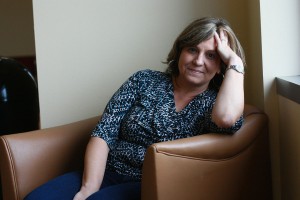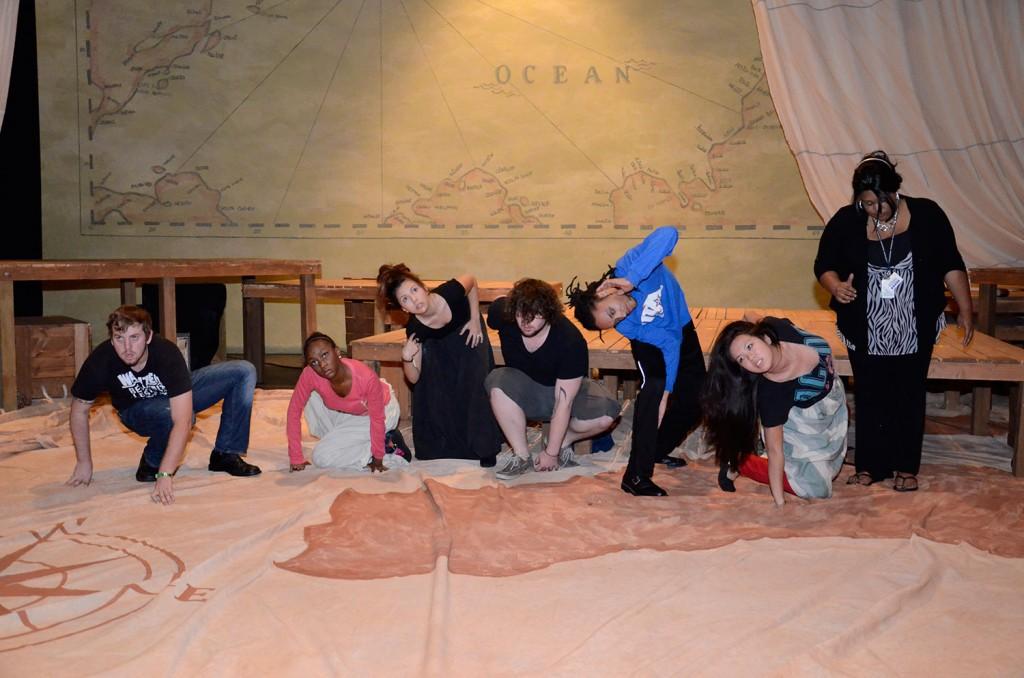By Mario Montalvo/multimedia editor

Carrie Duke/The Collegian
Only a thin sheet of glass separated Janet Rodriguez from her family as she boarded her flight from Havana, Cuba, to Miami, but she already knew they were worlds apart.
She doubted her decision to leave and began to miss her family as soon as the doors on the plane closed, she said.
That decision 19 years ago to leave her home and her family eventually led her to TCC.
“In our families, in our culture, you don’t just separate from your family,” said the TR Spanish instructor. “You don’t just go to a different country with a different language on your own, and you only leave the family when you’re married. I didn’t know if it was going to be possible for us to be reunited again, so it was really, really emotional.”
To leave Cuba is a long process, Rodriguez said. Her uncle started the paperwork for her to leave Cuba when she was only 12, and it took 13 years to process.
At that time, she was 25 and no longer considered part of her father’s nuclear family, so she had to go alone.
“My brothers had to go through military service before they were allowed to leave, and my mom said that she would never leave any kid behind. So she stayed with my brothers, and my dad also stayed behind and my parole [a type of asylum] was going to expire, so I left.”
Rodriguez wouldn’t be reunited with her family until five years after arriving in the United States.
Growing up in the small country town of Caimito del Guayabal, Cuba, outside of Havana, her school conditioned her to believe in the greatness of the government.
But her father would tell her that communism was not equality, she said.
“I argued with him because in school they taught me to love and understand why the socialist regime was good for us, so I had this idea that maybe my dad is old, he doesn’t understand,” she said.
She remembers hearing Fidel Castro speaking to the public in Havana’s Plaza de la Revolución, she said.
“We were just taken from school, put on a bus, and they drove us to the place,” she said. “I remember that they gave us a piece of bread and a small bottle of water, and that was it.”
As she walked past the
Communist Party building with her class, she peered through the tinted glass windows and saw a table filled with fruits, vegetables and meat, she said.
“I could see grapes, and I could see all that,” she said. “It was like a feast.”
She said it was then she realized, “Oh, maybe my dad is right.”
The experience opened her eyes to what it was really like living in a communist regime.
“It hurts so much, not only to see the level of poverty that my aunts and uncles are living in and my cousins and my friends but because of the frustration. I can’t do anything about it,” she said.
Each family would have a ration book and was allowed only a certain number of items per month, she said.
“It’s not only a struggle to find but to have that ration book match your day where they’re selling it,” she said.
Rodriguez remembers leaving school one day and seeing a truck with watermelons. She got in line to get a watermelon and had her brother run home to get their mother who had the ration book only to have them run out about an hour and a half later.
“I was seeing all the other people with the watermelons,” she said. “I had had this chance. It was almost in my hands. I almost tasted it, and it was gone. I just walked away, and when nobody saw me, I cried.”
Rodriguez wants her students to realize how fortunate they are to live in the United States.
“Even the most insignificant item that you think everybody has — a toothbrush, you know, people don’t have toothbrushes there, even ropa interior [underwear], whatever — the simplest thing is a struggle,” she said.
TR administrative assistant Jessica Garcia took a Spanish class with Rodriguez and remembers her stories about the political rallies and has fond memories of the class.
“She’s really warm,” Garcia said. “She’s very welcoming and approachable, and you can tell she truly cares, not just about her job but about her students.”
Garcia said she couldn’t have done what Rodriguez had to do.
“Talk about scary,” she said.
Rodriguez said her life did not change overnight.
“You have to work for it,” she said. “You have to work for everything here, and the big difference is that now you have a chance to make a difference. You have the possibility to achieve your dreams versus working and finding that there’s no result in your country of origin.”
She went to school to learn English and later met and married her husband, whose job relocated them to Texas.
It was then that she enrolled on NW Campus and completed her associate degree. She went on to earn bachelor’s and master’s degrees from the University of North Texas.
During her time on NW Campus, Rodriguez met Vilma Manteiga, a Cuban refugee with a similar story to her own that inspired her to succeed.
Manteiga was part of a 1960-1962 CIA project code-named Operation Peter Pan designed to deliver the children of parents who opposed the revolution safely to the United States.
“There was a rumor in Cuba about children being taken away from their parents and being sent to Russia or something,” Manteiga said. “So people who were against the government decided to send their children ahead, and I was one of those children.”
She arrived in Miami in 1962 at the age of 12. Her parents had made arrangements for her to attend a boarding school in Tampa, Fla.
“It was 90 miles, but it was like a million miles,” she said.
Right after she left, travel between Cuba and the United States was shut down.
“My parents and the people of Cuba thought it wouldn’t last more than six months, and we all know how long that has lasted,” she said. “It took my parents another four years or so to come. I didn’t even see my parents again until April of 1966. I was about to graduate. I was about 16.”
Manteiga has fond, vivid memories of her time spent living in Cuba.
“It’s a beautiful country,” she said. “It’s hot, but it’s such a small island that no matter where you live, you’re close to the ocean.”
Other NW teachers also inspired Rodriguez, she said.
“They really proved to me that I can do it,” she said of English assistant professor Rodney Rather and speech adjunct Bobbi Stringer.
“She [Stringer] was a great example and inspiration to me because I dreaded speaking in front of the class in a different language, but she really made a difference,” Rodriguez said.
“I was so stressed out about communicating in English. And I had ideas about things that they were discussing in class. I had all these ideas, but I didn’t have the English words to accompany my ideas. It was frustrating, but I wanted to set a good example for my daughters.”
The journey she began when she boarded the plane in Havana has not been an easy one, but it has made her stronger, she said.
“I personally believe that growth comes through pain,” she said. “My experiences have taught me to be humble, to be able to relate better to my minority students and to have a deep appreciation for the opportunities that my new country has offered my family and me.”



























